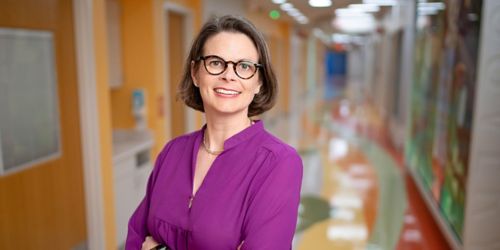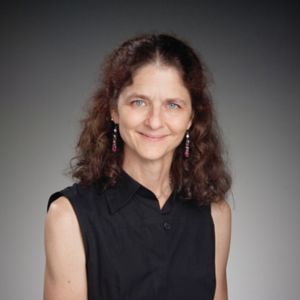St. Jude Family of Websites
Explore our cutting edge research, world-class patient care, career opportunities and more.
St. Jude Children's Research Hospital Home

- Fundraising
St. Jude Family of Websites
Explore our cutting edge research, world-class patient care, career opportunities and more.
St. Jude Children's Research Hospital Home

- Fundraising
Leukemia diagnosis sets path for Browne to become a nurse practitioner

Emily Browne, DNP, RN, CPNP, encourages young clinicians to ask to go in to see every patient possible and always have a question at the ready.
Emily Browne, DNP, RN, CPNP, director of the Transition Oncology Program and pediatric nurse practitioner at St. Jude Children’s Research Hospital, shares how her clinical and research career was shaped by a leukemia diagnosis. This is part of an ongoing series.
Question: Describe a person, experience or event that played a key role in your decision to pursue your career.
Answer: I was diagnosed with acute lymphoblastic leukemia as a senior in high school. Prior to this, I was on track to an elementary education career since I was 5 and playing school with my stuffed animals. During my leukemia treatment, I received wonderful care by several nurse practitioners. I’d never heard of a nurse practitioner, but the more I learned about what they did, the more I became interested. My mom really encouraged me to consider it as a career. By the time I started college, I’d changed my major to biology and declared my intentions to become a pediatric oncology nurse practitioner. My college did not have a nursing program, but it did have an affiliation with Vanderbilt University School of Nursing that offered an accelerated MSN program for non-nurses.
Q: Describe a person, experience or event that played a pivotal role so far in your career.
A: My college advisor and biology professor, Dr. Jeannette Runquist, had a huge influence on my passion for science. She saw potential in me and suggested I present at Honor’s Day, serve as her teaching assistant and be the student mentor for her first-year advisees. I never had the confidence to pursue these things on my own, but, because of her, I gained a ton of experience and confidence. I’ve tried to pay this forward. I am always on the lookout for staff or students whom I see potential in and can nudge forward. Dr. Runquist and I stayed in touch after I graduated, and to honor her, I endowed a scholarship at my alma mater in her name. After she died, I learned that she left her estate to St. Jude. I’m the only St. Jude connection that her family or colleagues were aware of.
Belinda Mandrell, PhD, director of Nursing Research, is the first person I met at St. Jude when I was a nurse practitioner student 18 years ago. She encouraged me to apply for the Robbie Simpson Nurse Practitioner Fellowship. During the fellowship, she introduced me to people around the hospital, included me in dinners out with her family and was supportive of me applying for a nurse practitioner position. She encouraged me to submit an abstract to present at a conference and return to school. She was the first person I visited when I began thinking about applying for a DNP program. She offered support in any way I needed. About a year later, she asked me to work in a newly created position, director of Professional Development. She was a source of constant encouragement and support in the six years I worked with her.
Q: What do you know now that you wish you had known as a student or early in your career?
A: I read an article that included the most meaningful advice the author had been given: “Invite yourself to the party.” I have it hanging on my bulletin board at work. Mentally, I’ve added “and take a seat at the table.” I wish I’d read that as a student and early on in my career. I was the type of student who sat quietly and politely and tried not to get in the way. The best students I’ve precepted are the ones who aren’t afraid to ask to go in to see every patient possible, who bring a list of people at the hospital they’d like to meet and always have a question at the ready. These are the type of people who invite themselves to the party.






